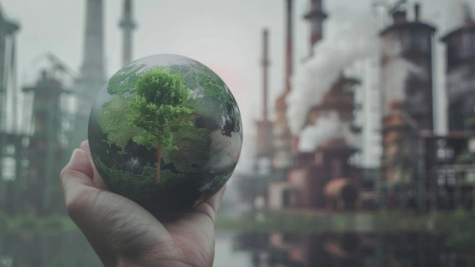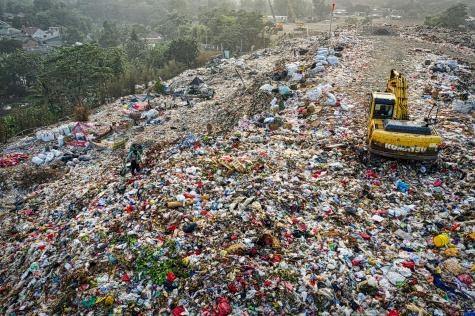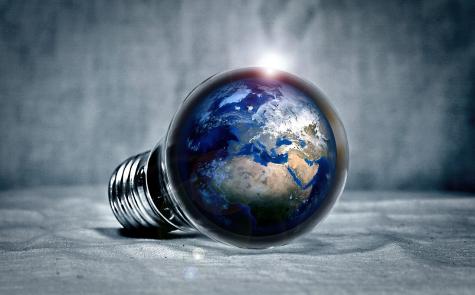OIL, COAL & Mining

➡️ Fossil Fuel Industry Guide – The Dirty Truth
Formed from the decomposition of buried carbon-based organisms that died millions of years ago, fossil fuels are non-renewable and, when burned, release vast amounts of carbon dioxide into the air.
In 2023, 82% of global energy was generated by coal, oil, and natural gas. This was a record year for energy demand as the Global South develops at a speed of twice the global rate.
The IPCC has warned that fossil fuel emissions must be halved within the next 11 years if global warming is to be limited to 1.5°C above pre-industrial levels.
Jump straight to our guide on ➡️ Oil, Coal, and Mining
Explore our comprehensive guides on -
-
The Climate Crisis
-
The United Nations Climate Conferences (COP)
-
The Mining Industry
We now have unequivocal evidence that fossil fuels are damaging our planet. As the largest contributor to the global climate crisis, energy production accounts for 75% of all greenhouse gas emissions and 90% of all carbon dioxide emissions.
Corporate greenwashing has been used for decades to distract the public from the reality of their business and allows them to continue operating with impunity. Climate denial and the withholding of key scientific findings have allowed Big Oil to continue upscaling operations. Companies such as ExxonMobil, Shell, and BP have kept this dirty secret since the 1970s, long before the public was made aware of the consequences of unchecked fossil fuel energy production.
-
Coal is the cheapest and dirtiest fossil fuel. Led by China and India, it is the single-largest source of carbon emissions.
-
In 2018, air pollution from burning fossil fuels was directly responsible for the deaths of 5 million people every year.
-
Fracking wells use between 1.5 - 16 million gallons of water. Wastewater is then released back into the environment, contaminating drinking water with toxic chemicals such as lead, arsenic, and mercury.

-
Over 99% of plastics are made from fossil fuels. Since the 1950s, more than 8.3 billion tonnes of plastic has been produced. 12 million tonnes of which finds its way into the ocean every single year. Up to 50% of plastic is used just once and then discarded.
-
The fossil fuel industry is built on inequality. People of colour are more likely to be exposed to air pollution that was created by white people.
-
The ocean absorbs more than a quarter of the carbon dioxide emitted from fossil fuels. This causes acidification, which threatens the survival of marine life, drives rising ocean temperatures, and causes sea levels to rise.
-
BP’s Deepwater Horizon oil spill in 2010 was the biggest environmental disaster of the last century. It released an estimated 4.9 million barrels of crude oil into the Gulf of Mexico, the equivalent of 300 Olympic-sized swimming pools. It led to the deaths of millions of marine animals and seabirds - the effects are still being felt today.

Why We Need a Big Coal Phaseout
Coal accounts for 40% of the total energy that we produce globally. It is by far the dirtiest fuel source and is hugely detrimental to the environment and the communities in the wake of its production. It causes contamination of water supplies, destroys landscapes, has long-lasting deadly health consequences for workers, and causes large-scale displacement.
Coal remains a popular source of energy, particularly in developing countries, as production is cheap. More than 40 countries have recently committed to phasing out coal, including major coal-producing countries such as Canada, South Korea, Indonesia, and Vietnam.
Find comprehensive guides to the coal mining business in the UK, Germany, Australia, and Poland, as well as information on highly toxic fly ash and various NGOs fighting to end Big Coal.

Big Oil vs The World
The term Big Oil is used to describe the world's largest oil and gas companies. They hold massive economic power and political influence. The biggest players include ExxonMobil, Chevron, BP, Shell, and Total Energies.
The OPEC cartel controls 88% of our planet's oil and gas reserves, as well as other state-owned companies, mainly in the Middle East. Despite the unprecedented need and global consensus to move away from fossil fuels, Big Oil profits reached their highest-ever levels in 2024 - $281 billion. This came at a time of spiralling inflation, a global cost of living and food crisis, increasing poverty and hunger, many national economic crises, and the aftermath of the COVID-19 pandemic.
Many of these issues were exasperated by the ongoing Russian invasion of Ukraine and the sanctions imposed on Russian gas and oil. This has pushed up energy prices dramatically, and rather than forcing countries to seek alternatives, it merely drove them to seek more gas and oil elsewhere, for a higher price.
Politically, Big Oil influences governments by investing huge amounts into lobbying and political campaigns. These lobbyists obstruct and delay governmental action on climate change and spread misinformation through climate denial.
Big Oil is dirty. Deadly air pollution, contamination of soil and water sources, large-scale destruction of public lands, and habitat destruction are just some of this industry's human and environmental impacts. The oil industry is also a leading cause of conflict. For more information, check out our section dedicated to fossil fuel companies – the bad guys.

The Energy Transition for a Better World
Scientists, climate activists, and the majority of the public support a global shift from fossil fuels to renewable, low-emission energy sources. Not only will a fast and just transition help to protect our planet, but it will also promote energy security, economic growth, and job creation in new energy sectors.
At current rates, the planet will fall well short of the 1.5°C goal, and by 2050, we are facing a carbon emissions gap of 16 Gt (gigatonnes).
Fossil fuel subsidies are one of the biggest barriers preventing the shift to renewable energy sources. They are designed to protect consumers by keeping prices low, but in reality, they create higher taxes, lower public spending, enable unchecked pollution, and strip investment from renewable energy projects.
Currently, only 30% of global energy is generated by solar, wind, and hydropower. To limit global warming to 1.5°C, the world needs to triple its renewable energy capacity by 2030.
Most countries have not yet committed to ending fossil fuel exploration, production, and use. With profits soaring, high levels of investment in the industry, and with their foot in the door of governments around the world, we face an uphill battle to phaseout fossil fuels.
With agreements such as the Paris Accord and the Sustainable Development Goals failing, a renewed focus, massive investment, and strict monitoring must be implemented to ensure countries fully commit to their climate pledges.
Author: Rachael Mellor, 21.02.25 licensed under CC BY-NC-ND 4.0
For more information on the Fossil Fuel Industry see below ⬇️
Info on OIL, COAL & Mining
- BIG OIL[1922]
- BIG COAL[651]
- Mining[789]
- Anti Environmentalists[32]